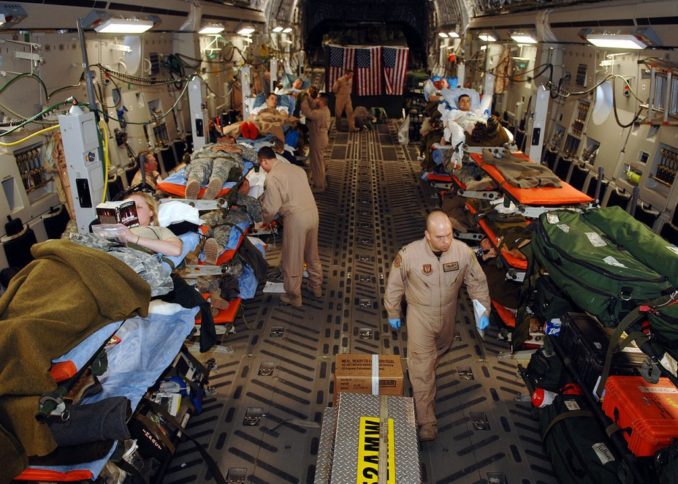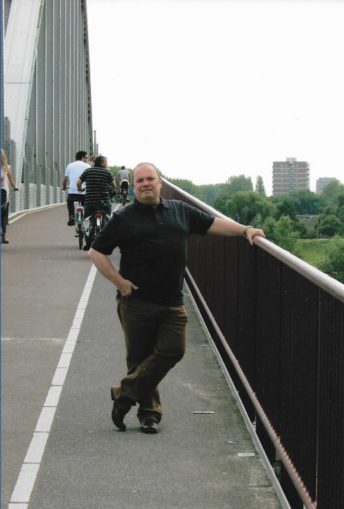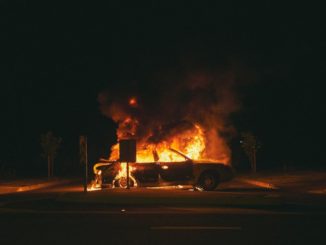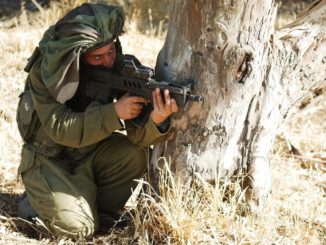
The Flying Hospital
“Allan do you want to go for an early lunch?” Margin asked.
“Do you mind?”
“Nope. Wheels were up 1045. By the time it’s wheels down, got them on board, wheels up, flight time and down at Bastion it should be thirteen-hundred-ish. I’m going to give the Role 3 at Bastion a call.”
“Thanks, Si… Chris. I’ve got my pager. Just call-me.”
“I won’t hesitate.”
Margin watched the live feed from RC South and was delighted to see that the RAF Firemen were having a 24 hour volleyball match for Children in Need. He ground his teeth and phoned the Patient Evacuation Cell at Bastion.
He recognised the slightly Welsh tones of the duty watch-keeper and smiled to himself. She was a bloody feisty Naval Warrant Officer. “Morning Ms Carstairs. This is the CJOC, Squadron Leader Margin.”
“Morning, Sir,” the Sir was slightly begrudged.
“I’m just checking for the afternoon CAG, is your ICU bed state still Amber?”
“I’ll check.”
She came back a minute or so later, “Hello, Sir. I’m afraid we’re red now. Someone’s turned over a Ridgeback and we’re holding the casualties. There are no ICU beds. But both theatres are free.”
Margin cursed RAF Firemen and Children in Need to Hades, “You have a MERT ongoing.”
“Yes. Sir. My boss sent you an e-mail, half-an-hour ago.”
He logged back on and checked his inbox. One e-mail and he had missed it. It had been sent one minute, forty-five seconds ago. He looked down at Allan’s chart and flight times.
“The MERT must return to Bastion. Because there’s no fuel for it to reach any other MTF.”
“That’s right, sir,” she said brightly, “We will operate on the casualties, but the Ward Master says the onward moves are down to ISAF. It’s all in the e-mail.”
“I need you to put together an aeromed team to move whatever casualties have been stabilised in your theatres for onward move to another medical treatment facility ICU or HDU, depending on their priority.”
“Sir we don’t have the assets to do that.”
Margin was starting to get annoyed, “You have the RAF Strategic aeromed team attached to the evacuation ward. I don’t care if you are misusing them to fill gaps because you’ve released your personnel on R&R. They are not Bastion assets, they are ISAF assets for us to use as we see fit. The trooper isn’t until tomorrow. I want your Ops officer ready for me to phone him at 1400, when I will give him the details of the flight and destination of the casualties and their in-transit care team. Meanwhile, make sure that the aeromed team is prepped and ready. Have you got that?”
He didn’t wait for an answer and put the phone down. Sometimes the turf war over ownership of assets made him want to bellow with frustration. It was as though everyone seemed to forget why they were there. He phoned his colonel, explained the situation and asked him to speak to the commander of the Role 3 hospital at Bastion, then went across to J3 Ops, specifically the air tasking cell. It was being manned by a British Army SO1, a lieutenant-colonel who was wearing an airborne smock. Margin was glad. The other SO1 was an RAF fast-jet jockey who was on a ground tour and was rather disdainful of aircraft that didn’t have jet engines and a pointy front end.
“Morning, sorry, afternoon Colonel.”
“Afternoon Mr Margin. What brings you to J3 Air Ops?”
“I need an aeroplane. A big one, two or four engines, A Transall or a C130 would be ideal.”
“You don’t ask for bloody much, do you, sunshine?”
“Sorry, Colonel, but it gets better. We need you to contact PJHQ and have a Critical Care in the Air Support Team moved up to one hour’s notice to move. Plus of course the strategic air asset. You’ve seen the live feeds, we have a developing situation down at RC South. We don’t yet know the full casualty numbers, but there are no ICU or HDU beds at either Bastion or Kandahar. I’m hoping RC East can provide, but we’ll need to move the casualties from Bastion to Bagram, or Konduz if the Germans are playing today, or Herat if they’re not.”
What impressed Margin was the Colonel’s lack of intake of breath or tooth sucking. He immediately grasped the situation and understood the implications, with none of the “it’s a hospital, there should be shitloads of beds,” bullshit.
“OK, leave it with me.”
Margin smile with gratitude and relief and spent the next twenty minutes trying to find an American at Bagram who had sufficient rank to make a bloody decision. Despite having the concept of mission command rammed down their throats at Staff College, the Americans were notoriously poor at implementing it. Allan came back a few minutes later. He hadn’t been anywhere near the dining hall. He had been speaking to his wife in Wyoming on Skype. Donne brought him up to speed very quickly and Allan settled comfortably into the ops console, like he was wrapping the situation around himself.
The British Para SO1 from J3 Air wandered up like an assassin. He smiled grimly but sympathetically at Margin.
“I’ve got some good news and of course some really bad news. I’ve magically found you a Canadian C130, which will be wheels down at Bastion at 1435. The bad news is that it was the round-robin flight picking up the R&R passengers for tomorrow’s trooper flight from Kandahar. Congratulations, you are now the most hated man in ISAF.”
“The C130 will be going to Bagram, as and when they’ve stabilised the casualties in theatre. What about the CCAST?” Margin asked in his best “might as well get hung for a sheep rather than a lamb,” demeanour.
“At least three hours. Don’t push it. Who do you think you are, tasking my air assets? Lord Trenchard?” The Para smiled grimly and with genuine empathy, “And if you need anything else, just fuck off.”
Allan looked at the retreating back of the airborne smock and blinked in bewilderment, “Who is that asshole?”
“One of the good-guys, Allan. Remind me to explain British irony to you.”
* * *
The WIMIK had arrived and had swiftly dealt with the single sniper who dominated the potential landing site. Sergeant Welland/s multiple kept the sniper pinned in his ill-chosen ambush position that had no safe escape route from his cover. As soon as the Taliban tried to make effective fire, the multiple’s LSW and fire team concentrated supressing fire on his position. The WIMIC’s .50 Cal destroyed the cover and turned the 17-year-old’s body into a bag of mince held together by dirty rags. The Land Rover turned round over the rough ground and headed for the other flank on the poppy field, while Welland’s multiple cleared the landing site.
Lieutenant Morse had moved from the frightened and confused stage to a man on top of his game. In a textbook fashion, his multiple had kept the enemy supressed in their cover, while his second multiple had moved up the drainage ditch, and were now bringing fire down on the enemy’s flank. The icing on the cake was when the WIMIK Land Rover pushed her snout into the poppy field and her .50 Cal was sending four-ounce rounds down on the Taliban position. It was a much slower rate of fire but heavy and seemed to come up through the ground. The enemy fire slackened and then stopped. Emboldened, Morse moved his multiple forward to fight through and win the firefight. There was one of the Taliban left alive to bring down effective fire. He knew he was about to be a martyr and fired a short burst before a .50 Cal round removed his right arm, shoulder and head.
The 7.62 round that hit Morse had a muzzle velocity of 2,350 feet per second. It punched through the nylon and Kevlar shoulder pad, just above the body armour’s ceramic ballistic plate. Starting to flatten, the round hit him on his left clavicle. It had missed the carabiner clipped onto the front of his webbing. It dragged fragments of man-made fibres and dirt into the cavitation. Normally, the round would have shattered the clavicle and exited out of his back after crushing his ribs. Morse was bent forward, running and the round deflected downwards after breaking the clavicle. It was spinning under its own momentum and breaking up, ploughing through Morse’s aortic arch, narrowly missing the superior vena cava, burrowing through his right lung. Most of the fragments ended up in his liver. The bulk of the flattened round destroyed Morse’s right kidney and exited his back, becoming wedged between the rear of the body armour and his Camelback.
The young lieutenant felt the force of the impact like a cricket bat had hit him in the left shoulder and then a pain as though he was being disembowelled with a hot poker. His own forward momentum picked his legs off the ground, spun him round and dumped him in the dirt, face up. He looked up at the yellow-blue sky above the waving poppies.
“Oh Christ, it hurts…”
Like the true warriors they were, Morse’s multiple carried on going forward and cleared the field. The friendly fire to their right slackened as they move into the fight-through, the WIMIK fell silent and they reached the tree-line where they found only bloodied rags and three slumped bodies. Dispassionately they riddled the corpses with short bursts to the head, well two of them, the third’s seemed to be missing and they spat out the swarms of flies that were already heading in. They were playing by the Taliban rules. No feigning death to suddenly rear up and detonate a grenade in the middle of them. No helmet cameras and no fucking bullshit. The three Toms went back into the poppy field and rolled the screaming Morse into a poncho, injected him with his own morphine auto jet, writing an M and the time on his forehead with a map marker pen, then they dragged him out of the field, over the canal onto the road.
The Chinook approached from the north and swept over the compound, while the Apache hovered above. Sergeant Welland threw a green smoke grenade to mark the LZ and denote that it was uncontested. Chinook Delta-Tango-One-Eight flared and her twin rotors chopped the green smoke into tendrils and as she settled, the familiar and hated orange dust with the consistency of talcum powder obliterated all visibility.
Corporal Steer was relieved to hear the Chinook and didn’t even look up as its shadow swept overhead. He had managed to insert a central venous catheter into the young, black Tom’s neck, but the blood was still spreading in the dust and the flies were maddening. Rifleman Valentine was slipping away. The deafened P3 was holding up the saline bag and the P2 was staring at the bloody dressings on his hand, moaning how unfair and painful it all was. Steer almost lost the will to live when Morse was dragged in on a poncho. The morphine was kicking in, the young officer had stopped screaming and was crying for his mother.
“Could you please help Mr Morse, Godfrey? He’s taken one in the chest. We’ve given him his morphine.”
* * *
The RAF Regiment gunners were first out into the choking, orange dust, spreading out to cover the Chinook.
“Clear.”
Lieutenant-Colonel Trent was first off the ramp while Flight Lieutenant Owens unplugged her helmet, tucked the cable inside her body armour and followed the paramedics out. The ground troops had moved the casualties to within one-hundred metres of the helicopter, clear of the noise and dust. Two were standing. Good. Two had been dragged on ponchos. Bad. There was a third, semi-sealed poncho that sploshed slightly and dripped. Very bad. The RAMC Combat Medical Technician gave the MERT team the most comprehensive, accurate and relevant casualty handover briefs they would ever receive. The young medic’s dusty face was streaked with sweat and he was close to tears, his voice strained with emotion. The paramedics and the ground troops loaded the casualties into the helicopter, supervised by Trent. Owens grinned at the exhausted medic.
“Good job,” she said and in a most unmilitary fashion, hugged the Corporal before disappearing into the back of the Chinook. The RAF Gunners followed her in seconds later. The Chinook had been wheels down for three minutes, forty-five seconds.
Delta-Tango-One-Eight heaved her broad arse back into the air and headed off low across the trees. The Apache pirouetted and followed her, nose down and looking for trouble. By the time the dust had settled, the sound of the Chinook was a distant wok-wok that was as felt as it was heard. The patrol waited for an hour before moving back to FOB Edgehill.
“Hey, Godfrey,” a Rifleman said almost pleasantly to Corporal Steer, “I think that Crabette really liked you. You did all right by the way.”
Steer doubled up and vomited the excess water he had chugged down, into the dust.
* * *
In the back of the juddering, twisting Chinook, immersed in the heat and the noise, the MERT team was aggressively trying to save the lives of Rifleman Valentine and Second Lieutenant Morse. Steer had done his job well, the central line keeping enough fluids inside Valentine to prevent him slipping into hypovolemic shock. He had applied two first field dressings to the wound in his side, which were soaked through with blood, but there was something happening inside his body distending the young soldier’s abdomen. Only opening him up on an operating theatre would pinpoint the trouble. He was unconscious and going further down the Glasgow Coma Scale with frightening speed.
Morse was still conscious, in a great deal of pain and in danger of drowning in his own blood. His eyes were open, staring and terrified, his blood bubbling out of his nose and mouth. Trent was trying desperately to find the internal source of the pneumothorax while a paramedic aspirated. He glanced up at the loadmaster and raises his eyes in question. The loadmaster held up his a fist and opened it twice. Ten Minutes.
* * *
In Oxfordshire the frost still lay in the shadows of the buildings and the trees. It was just after 0800 British Standard Time or ZULU, on an early spring morning where the sky was like cut glass. Sitting squat on the pan of RAF Brize Norton, lurked a Boeing C17, 0ne of the largest aircraft in the RAF’s inventory. Its rear ramp was down and the lights were on inside the aircraft’s cavernous interior. The RAF Movers were bringing the aircraft into life for her short notice tasking. The C17 may have been requisitioned for a CCAST casualty move, but other freight was also liked up on the apron. A Tornado engine for Kandahar. A Pinzgauer six-wheeled vehicle for DFID and pallets of two-kilogramme fertilizer sacks with the DFID logo and a little Union Flag. If any proof were needed of the stupidity of foreign aid, it was those fertilizer sacks. The fertilizer was supposed to improve Afghanistan’s soil in order to grow pomegranates. The local farmers could earn ten times more from growing poppies in soil that didn’t need fertilizer. But the Taliban could use those bags. They mixed the fertilizer with other, readily-available ingredients to make extremely potent explosives. So the British taxpayers were funding the Taliban to make explosives to kill British soldiers, aided and abetted by a Government department.
In another part of the base, medical staff were prepping the huge amount of sophisticated medical equipment that would be needed to keep the casualties alive. The ground electronics technicians checked the batteries on ventilators and giving sets. The medics Lugged Lacon boxes and oxygen bottles into the back of the vehicle, to take them to the aircraft.
Just east of Whitney on the A40, an anaesthetist had departed his home in north Oxford and was driving towards Brize Norton, leaving his mornings’ theatre list in a total state for someone else to sort out. He worked at the John Radcliffe Hospital, but he was a Wing Commander RAF Doctor and his pager had gone off at 0745. His bags were packed and in the spare room. A Bergen with enough clothes and kit to last for 48 days and a holdall with body armour, helmet, camelback, boots and combat clothing were on the back seat. He had told his wife that he expected to be home by the following evening, but like most things, nothing in life was certain.
* * *
Just before 1600 Local, the general surgeon in operating theatre number 2 of the Hospital at Bastion, stepped back from the table and conceded that despite having tried everything, Rifleman Valentine had died in the back of the Chinook several minutes before wheels down. He had been too close to the blast wave of the IED, which had caused catastrophic injuries to his internal organs.
“I think we should call it.”
The exhausted theatre team nodded their consent.
“Time of death 1557.”
In the recovery room of theatre number 1, in his medically induced coma, Second-Lieutenant Morse dreamed that he was having a conversation with his guardian angel. This wasn’t some Hollywood angel in a black suit and dark glasses, this was the real McCoy complete with a beautiful, glowing, androgynous face and wings, real wings of feathers. Just like the Children’s Illustrated Bible he had received after his first communion.
Am I dead?
You never die here.
Really? Will I be all right?
The angel smiled enigmatically.
In the refrigerated ISO Reefer at the back of the hospital, most of Rifleman Green would have disputed that.
* * *
Squadron Leader Margin picked up the phone in the CJOC about fifteen minutes later, “Hello Ms Carstairs.”
“I’m afraid there’s only one P1 for evacuation to Bagram now,” Her voice sounded empty.
“Oh God, sorry to hear that. When’s the C130 taking off?”
“1700.”
“You may want to consider loading on a few P3s that would have been on tomorrow’s trooper evacuation flight, to go out on the C17 tonight.”
“Already done, sir.”
“I’m really sorry. I’ll be here until the C17 lands at Bagram if you need anything,” he turned to the American SO3, “Allan, we lost two of the P1s. I’m going for a fag,”
Margin finally left the CJOC at 2330, the C17 having landed with the CCAST team and the casualties were due to fly out at 0100. The Headquarters complex was largely empty, and the night sky was brightly pinpointed with stars. The surrounding mountains glowed with snowfall in the half moon. Outside of the Hesco Bastions, he popped into the British Contingent building to check his mail. The building was housed behind the strores block, a two-story prefab complex with offices above and telephone room and TV rooms as well as a small EFI (Operational NAAFI), below.
He had no mail, no bluey, which was disappointing and Margin decided to phone home from his office. British military personnel then, were granted 20 minutes phone card time per week. Prisoners in the UK were entitled to an hour. He had purchased a Banana Card from the American BX, which allowed much longer phone calls, which were directed through Ramstein in Germany.
Margin popped into the TV room to see if there were any paperbacks he hadn’t read, which was empty apart from two cats sitting on one of the chairs. The smaller of the two was licking the cat, whose front legs were wrapped with bandages. They both stared at him with yellow eyes, cautiously and almost with hostility.
“Evening. Mr Garfield I presume,” he looked closer and saw there was what appeared to be a couple of pencils under the, bandages. He smiled and also felt a wave of sadness that someone could commit such a pointless, random act of cruelty.
“Good man, Stavros,” he said out loud and left the cats to it.
The CJ Med offices were empty and they had left the air conditioning on full blast. He turned it off and as he sat down, the forgotten about flask in his smock clanked against the metal of the office chair. He dialled the number on the Banana Card, adding his own home number. The call took its convoluted way through fibre and satellite connections until he heard the ring tone.
“Hello?”
“Hello, it’s me.”
Hearing the voice, loneliness suddenly swept over him like despair. Margin’s eyes prickled and watered for cats and men…
* * *
Second-Lieutenant Morse woke up in a Birmingham hospital six days later. His neck and chest hurt from the ventilator tubes and he opened his eyes to see an extended Pakistani family staring at him from around the opposite bed. Thinking he was still in the poppy field, Morse gasped and made a grab for his rifle. A male nurse stalked up the ward and drew the screen round his bed.
“Hello, Simon. We were wondering when you’d join us.”

© Blown Periphery 2023

Christophe Downes 28th July 1957 – 30th March 2023



